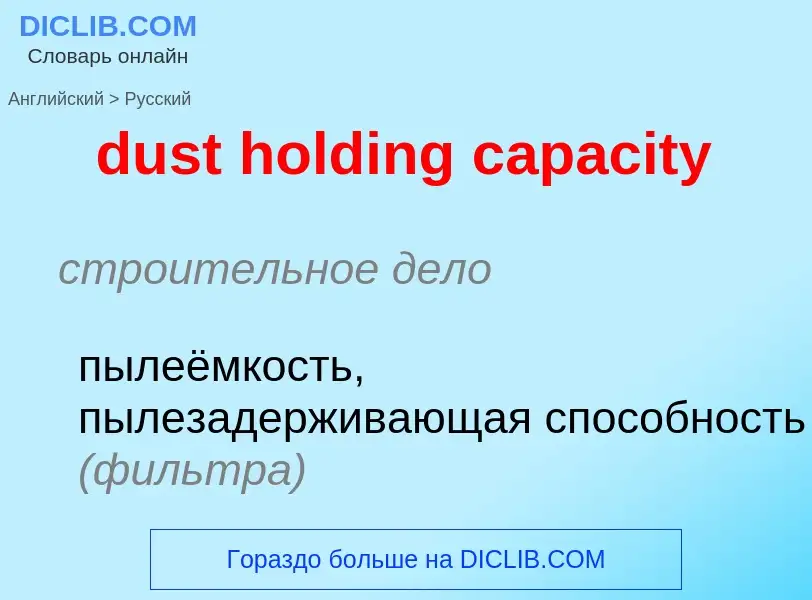Vertaling en analyse van woorden door kunstmatige intelligentie ChatGPT
Op deze pagina kunt u een gedetailleerde analyse krijgen van een woord of zin, geproduceerd met behulp van de beste kunstmatige intelligentietechnologie tot nu toe:
- hoe het woord wordt gebruikt
- gebruiksfrequentie
- het wordt vaker gebruikt in mondelinge of schriftelijke toespraken
- opties voor woordvertaling
- Gebruiksvoorbeelden (meerdere zinnen met vertaling)
- etymologie
dust holding capacity - vertaling naar russisch
строительное дело
пылеёмкость, пылезадерживающая способность (фильтра)
Definitie
Wikipedia
Field capacity is the amount of soil moisture or water content held in the soil after excess water has drained away and the rate of downward movement has decreased. This usually takes place 2–3 days after rain or irrigation in pervious soils of uniform structure and texture. The physical definition of field capacity (expressed symbolically as θfc) is the bulk water content retained in soil at −33 kPa (or −0.33 bar) of hydraulic head or suction pressure. The term originated from Israelsen and West and Frank Veihmeyer and Arthur Hendrickson.
Veihmeyer and Hendrickson realized the limitation in this measurement and commented that it is affected by so many factors that, precisely, it is not a constant (for a particular soil), yet it does serve as a practical measure of soil water-holding capacity. Field capacity improves on the concept of moisture equivalent by Lyman Briggs. Veihmeyer & Hendrickson proposed this concept as an attempt to improve water-use efficiency for farmers in California during 1949.
Field capacity is characterized by measuring water content after wetting a soil profile, covering it (to prevent evaporation) and monitoring the change soil moisture in the profile. Water content when the rate of change is relatively small is indicative of when drainage ceases and is called Field Capacity, it is also termed drained upper limit (DUL).
Lorenzo A. Richards and Weaver found that water content held by soil at a potential of −33 kPa (or −0.33 bar) correlate closely with field capacity (−10 kPa for sandy soils).


![Cosmic dust of the [[Andromeda Galaxy]] as revealed in infrared light by the [[Spitzer Space Telescope]]. Cosmic dust of the [[Andromeda Galaxy]] as revealed in infrared light by the [[Spitzer Space Telescope]].](https://commons.wikimedia.org/wiki/Special:FilePath/Andromeda galaxy Ssc2005-20a1.jpg?width=200)


![Cosmic dust of the [[Horsehead Nebula]] as revealed by the [[Hubble Space Telescope]]. Cosmic dust of the [[Horsehead Nebula]] as revealed by the [[Hubble Space Telescope]].](https://commons.wikimedia.org/wiki/Special:FilePath/Horsehead-Hubble.jpg?width=200)



